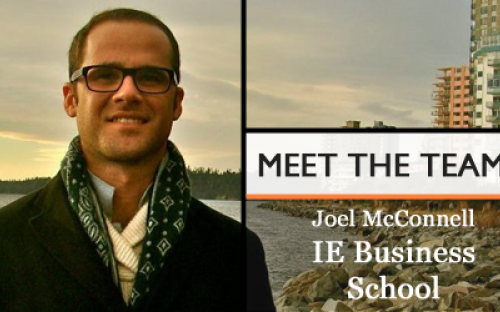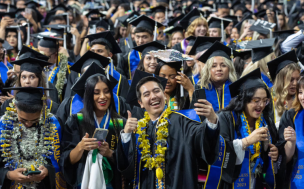Where does financial aid fit in the MBA application process?
An MBA applicant will be in contact with many different departments at our institution, typically starting with International Development and then Admissions, before they reach the Financial Aid team. It's important that we recruit the best students, and once we get them we need to make sure they can meet their fees and other expenses associated with the MBA. In Financial Aid we deal with many types of student profiles, but most typically we see two types of admitted applicants: those who really can't afford to pay and those who have been offered funding by other schools and are weighing up their options.
What types of funding are available at IE?
There are three main options. Firstly, we provide scholarships via our charitable organization IE Foundation, which are merit-based and awarded to applicants who have excelled professionally/personally but do not have the resources to fund an MBA. You must fulfill a range of criteria (e.g. demonstrated financial need, sought after diversity, academic results, etc.) to apply for the various scholarships and you're advised to apply as soon as you're admitted to IE. Secondly, we offer loans with rates of 3.5% to 5.5% and repayment periods of up to 10 years, and there are no penalties for early repayment. Additionally, we list 43 different lenders around the world, who offer competitive loan options in local currencies. Thirdly, we run the IE Fellows Program, providing financial assistance towards tuition fees in exchange for a contribution to an IE on-campus project. In total about 40% of IE MBAs benefit from these scholarships, loans and fellowships.
How much does an IE MBA cost?
The tuition fees for different post-grad management programs at IE range from 29,000 Euros to 105,000 US dollars depending on the program. The International (full-time) MBA costs 59,200 Euros and the Global (part-time) MBA costs 45,200 Euros. These fees go towards paying for IE's world-class professors and faculty, student services, special interest projects and innovative facilities.
You describe the elite MBA experience as being similar to a luxury product, what have you learned about luxury marketing?
In addition to my MBA and Master in Finance, I recently completed IE's Diploma in Management for the Luxury Sector. It's interesting to understand how the Luxury sector works and what parallels we can draw with a top MBA program. In a down-turn consumers gravitate towards purchases which are either low-cost or a 'sure-bet' and it’s the offer that lies in the middle that dies out. If you're looking to invest in your future, you'll invest in the second option - the 'sure-bet' - rather than a low-cost option. Ultimately a luxury product, and here we’re talking about a top MBA experience, is competing on innovation, quality in design, best- in-class components and a superior overall experience, not the lowest price. There's also an important emotional component in choosing an MBA because you are joining a professional network that will last the duration of your professional life.
What do you often hear from applicants?
One of the most frequent concerns that come up is around corporate sponsorship and why companies are generally reducing the funding they offer for continued professional development via master-level studies. Whilst many companies offer non-monetary support (such as paid leave to study for a part-time MBA), fewer companies are funding employees’ business school studies. Many applicants also talk to us about how they can reduce their out- of-pocket up-front costs, in terms of loans, scholarships or fellowships.
Do you have a special focus on female applicants?
Like most business schools we're always looking to attract top female applicants. In addition to providing access to special support before, during and after the MBA program, we also have a wide selection of scholarships available for women students. One of our key institutional long-term goals is to get more women on Executive Boards at top organizations worldwide.
How has your background in financial services helped in your current role?
I worked for a large North American investment firm, as a financial products expert for investment brokers who would on-sell to high-street investors. It was great training to understand the role of financial, tax and investment planning, all of which are important considerations when we advise MBA applicants on how to fund their MBA experience.
Does having an MBA from IE make it easier to connect with applicants?
Yes! I can put myself in the position of someone applying, because I went through that decision-making – and program funding, process myself. I was an alumnus before I was a staff member at IE, and I think candidates appreciate that.
What's the ROI on an MBA today?
Finances are now more important than ever and most applicants are looking at what 'return' they can get. The difficulty is in assessing what return you are looking for! There are both qualitative and quantitative ways to measure ROI and the first step needs to be an analysis of what you want to do after your MBA. If your goal is professional advancement in a slightly (or very!) different field to your current work, then you might not achieve a significant pay rise directly out of the program, but an MBA could be one of the few routes to enable such a career shift. An example that springs to mind is a Canadian medical doctor who recently graduated from IE. Before the MBA she was working in a hospital in Toronto and had decided that she wanted to shift her career into public health policy; so a government position. We awarded her with a fellowship to pay towards her tuition costs and, though the fellowship program she got to work on a public health project with an IE researcher that helped to boost her professional experience. The MBA and her project experience enabled her to get a job in public health when she returned to Canada - thus achieving her goals and delivering strong ROI!
RECAPTHA :
3a
b6
b1
e3







